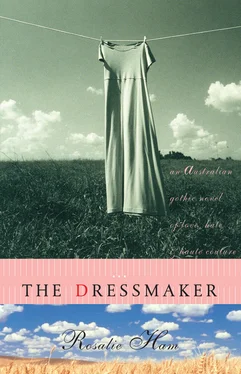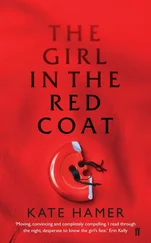Rosalie Ham - The Dressmaker
Здесь есть возможность читать онлайн «Rosalie Ham - The Dressmaker» весь текст электронной книги совершенно бесплатно (целиком полную версию без сокращений). В некоторых случаях можно слушать аудио, скачать через торрент в формате fb2 и присутствует краткое содержание. Год выпуска: 2000, ISBN: 2000, Издательство: Duffy & Snellgrove, Жанр: Историческая проза, Современная проза, на английском языке. Описание произведения, (предисловие) а так же отзывы посетителей доступны на портале библиотеки ЛибКат.
- Название:The Dressmaker
- Автор:
- Издательство:Duffy & Snellgrove
- Жанр:
- Год:2000
- ISBN:9781875989706
- Рейтинг книги:5 / 5. Голосов: 1
-
Избранное:Добавить в избранное
- Отзывы:
-
Ваша оценка:
- 100
- 1
- 2
- 3
- 4
- 5
The Dressmaker: краткое содержание, описание и аннотация
Предлагаем к чтению аннотацию, описание, краткое содержание или предисловие (зависит от того, что написал сам автор книги «The Dressmaker»). Если вы не нашли необходимую информацию о книге — напишите в комментариях, мы постараемся отыскать её.
The Dressmaker — читать онлайн бесплатно полную книгу (весь текст) целиком
Ниже представлен текст книги, разбитый по страницам. Система сохранения места последней прочитанной страницы, позволяет с удобством читать онлайн бесплатно книгу «The Dressmaker», без необходимости каждый раз заново искать на чём Вы остановились. Поставьте закладку, и сможете в любой момент перейти на страницу, на которой закончили чтение.
Интервал:
Закладка:
With thirteen seconds left of time-on, Winyerp kicked a goal to even the score. Teddy McSwiney, miles out of his position, went under the pack at the ball-up, scooped up the ball as it fell between the leaping legs and ran with it. He shrugged off reaching hands as though he was covered in hot Vaseline, bounced his way towards the four tall poles and kicked a wobbly left footer that slipped off the side of his boot to bounce low and dribble towards the goalposts. It toppled through for a point as the final siren sounded, the red, green and mud-coloured pack lunging through the posts over it.
Dungatar 11-11-77
Winyerp 11-10-76
The sound of blaring car horns lifted the sky and the crowd screamed with lust, revenge, joy, hate and elation. The earth shook to the sound of clapping and stamping while the tight bleeding wave of sportsmen raged back across the oval like a boiling clump of centipedes into the arms of the waiting fans. No team was ever happier, no town ever noisier. As the sun set the club song amplified over the plains of Dungatar and the entire town bounced down to the Station Hotel.
Penny bangers shuddered the doorjambs and skyrockets flew, setting crops alight two miles away. Purl was dancing behind her bar in white shorts and a striped football guernsey, fishnet stockings and football boots laced all the way up to her knees. Fred Bundle wore a mud-stained goal umpire’s coat, and two white flags adorned with tinsel and flower-shaped cellophane shot roofwards from a red and blue beanie. He looked like a small elk at Christmas. The rabble were in various stages of undress and inebriation – embracing indiscriminately, singing, dancing onto the footpath or swinging down from the balcony on the unfurled fire hydrant hose. Some chose a quiet corner to knit, chat, breast-feed. Reginald – a meat cleaver wedged in his hat – played the fiddle, while Faithful O’Brien stood by her microphone bantering with three young women in the corner – the McSwiney girls wearing rouge, their stocking tops and pettycoat lace draped over their crossed thighs. They had flowers in their hair – blue roses – and were smoking cigarettes and giggling. The sergeant danced on the bar wearing top hat, tails and tap shoes. Skinny Scotty Pullit thrust his watermelon firewater at everyone, saying, ‘Suck this, special drop.’ Teddy took a sip. His lips turned into a big O and the fire burned all the way down into his gullet. He reached for more. Septimus Crescant was handing out leaflets about his Flat Earth Society. He encountered William looking fearful with his arms crossed against Gertrude, who was beaming closely down on him. Elsbeth sat at his side, displeased, with Mona beside her bursting to dance but afraid. William took a leaflet then eased away from Gertrude, moving with Septimus to the bar. When they arrived Septimus took his hard hat off and threw it on the green-marbled linoleum. The top of his head was flat, his dome straight enough to set a bowl of jelly on. ‘Very sturdy,’ he said, stepping onto the hat.
‘Why do you wear it?’
‘There was an accident when I was a babe in arms – a fall. I’m no good at heights at all. I moved here because of the terrain and because it’s a long way from the edge. It’s a fraction above sea level as well, so we won’t be flooded when the end comes – the water will run away from us down to the edge. And of course there’s The Hill.’
‘The end?’
A dart whistled past the men. It landed between Robert Menzies’ eyes. ‘A toast!’ called Sergeant Farrat. ‘To today’s second place getters in the art of balling by foot. To Winyerp.’
There was silence while everyone swallowed.
‘And now a proud toast for our noble, brave and victorious sportsmen, the Dungatar First Football Team.’ Then there was a deafening noise, whistling and applause. The team were lifted onto shoulders and marched around the bar, with the club song sung again, and again, and again.
When Beula Harridene passed the hotel just before dawn the party was still in progress. Bleary people were strewn about the footpath in pockets and piles, bushes shimmered to the sound of frottage, men were being led home by the hand and Scotty Pullit sat upright at the bar, asleep. Purl stretched alongside him, also asleep. Fred sat next to them sipping a hot cup of Horlicks.
8
Ruth Dimm leaned against the wheel guard of her post office van in the morning sun and squinted along the railway tracks. Hamish O’Brien walked down the platform carrying a dripping watering can, drenching the petunias, which were bunched like frilly socks on the veranda posts. In the distance, a long tooooooot sounded. He stopped, checked his fob watch then stared off towards the soft sounds, chuff chuff chuff chuff. The ten past nine Thomson and Company SAR raced towards Dungatar at a top speed of 32 mph, all steam and clatter and thumping.
It drew towards the station, the long connecting rods slowing beside the platform, the pumping pistons easing, steam ballooning white and grey, then the giant black engine screeched, halted, rumbled and sighed. The flag-man waved, Hamish blew his whistle and the guard threw the great canvas bags of mail to land at Ruth’s feet. Next he dragged a cowering liver-coloured kelpie pup on a lead over to Ruth. It had a tag stuck to its collar that said, ‘Please give me a drink.’
‘This fer Bobby Pickett?’ asked Hamish.
‘Yes,’ Ruth was rubbing the puppy’s velvet ears, ‘from Nancy.’
‘Hope it’s not as scared of sheep as it is of trains,’ said the guard and slid a tea-chest from his hand cart onto the gravel next to the van. Hamish and Ruth looked down at it. It was addressed to Miss Tilly Dunnage, Dungatar, Australia, in big, red letters.
The train pulled away and they watched it until it was a puff of grey smoke on the horizon. Hamish turned his beefy face to Ruth. Tears sat sideways in the cream coloured folds beneath his blue eyes. He shoved his pipe between his teeth and said, ‘It’s the diesel taking over you see …’
‘I know Hamish, I know …’ said Ruth, ‘… progress.’ She patted his shoulder.
‘Damn progress, there’s naught that’s poetic about diesel or electric. Who needs speed?’
‘Farmers? passengers?’
‘To hell with the blooming passengers. It’s got naught to do with them either.’
• • •
Because of the forthcoming footballers’ dance and the Spring Race meeting the mailbags were filled with parcels – Myers catalogues, new frocks, materials and hats – but Ruth concentrated on the tea-chest with the red address. Its contents were scattered about her feet. Small parcels, calico-wrapped, tied and glued, wax-sealed tins and wads of folded material, that Ruth had never seen before. There were recipes and pictures of foreign food, photographs of thin, elegant ladies and angular men, mannequins smiling in front of famous landmarks of Europe. There were postcards from Paris written in French, opened letters postmarked Tangiers and Brazil, addressed to someone else in Paris, but now sent on for Tilly to read. Ruth found some unusual buttons and matching clasps in a jar, some odd-shaped buckles and yards and yards of fine lace in a wrapped bundle post-marked Brussels, and some books from America – The Town and The City , and one by someone called Hemingway. Ruth read a page or two of the Hemingway but found no romance so tossed it aside and removed the tape securing the lid on a small tin before prising it open. She pressed the tip of her long nose into the dried grey-green herb inside. It was sticky, sweet-smelling. She replaced the lid. Next she unscrewed the top from a jar that held a lump of moist brown-black glue-like matter. She scratched at its surface and tasted it. It smelled as it tasted, like molten grass. There was a small jar of fine greyish powder, bitter-smelly, and an old Milo tin containing what looked like dried mud. Someone had scrawled, ‘Mix with warm water’ on the green label.
Читать дальшеИнтервал:
Закладка:
Похожие книги на «The Dressmaker»
Представляем Вашему вниманию похожие книги на «The Dressmaker» списком для выбора. Мы отобрали схожую по названию и смыслу литературу в надежде предоставить читателям больше вариантов отыскать новые, интересные, ещё непрочитанные произведения.
Обсуждение, отзывы о книге «The Dressmaker» и просто собственные мнения читателей. Оставьте ваши комментарии, напишите, что Вы думаете о произведении, его смысле или главных героях. Укажите что конкретно понравилось, а что нет, и почему Вы так считаете.











